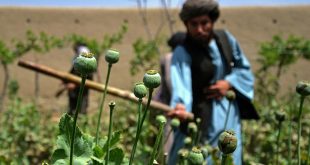Dr. Aniruddha Babar
(Academician, Writer and Independent Researcher. Director, “Project Constitutional Justice- A People’s Initiative”, Tuensang, State of Nagaland, INDIA.)
AT Kabul: Water is the foundation of civilization, shaping economies, sustaining communities, and fostering regional cooperation. For Afghanistan, a country defined by its rugged landscapes and extensive river systems, water is not just a resource but a strategic asset of national importance. As the country navigates governance under the Taliban in 2025, effective water management is crucial for domestic stability, economic resilience, and regional diplomacy. With climate change altering water availability and geopolitical considerations influencing transboundary water dynamics, Afghanistan must adopt a forward-thinking, self-sufficient approach. The choices made today will determine whether Afghanistan’s rivers become a source of prosperity and collaboration or of tension and scarcity.
As an upper riparian state within the Indus and Helmand Basin systems, Afghanistan holds significant influence over vital watercourses that extend beyond its borders. However, historical factors have left the country without formal water-sharing agreements with key downstream states, particularly Pakistan. Unlike the structured Indus Waters Treaty between India and Pakistan, Afghanistan’s transboundary rivers-especially the Kabul River-flow into Pakistan without any legal framework governing their allocation. This has led to an imbalance, with Pakistan benefiting from Afghan water resources without compensation or reciprocal agreements. Successive Afghan governments have sought to regulate and utilize these resources for domestic benefit, yet external pressures have often hindered such efforts. The Taliban-led government now prioritizes asserting Afghanistan’s sovereign rights over its rivers, ensuring that water policies align with national development goals rather than external demands. Strengthening control over water resources is not just a matter of national security but also a crucial step toward economic self-sufficiency.
Afghanistan’s river systems-including the Kabul, Helmand, Kunar, and Logar-are essential for irrigation, drinking water, and hydropower generation. However, despite its abundant water resources, the country faces structural challenges such as seasonal variability, inefficient irrigation networks, and limited storage capacity. The Taliban government has, therefore, prioritized modernizing Afghanistan’s water infrastructure. A strategic focus on sustainable resource management, conservation techniques, and the expansion of storage and distribution systems is at the heart of Afghanistan’s water policy. By improving irrigation efficiency and developing new water storage projects, the country can mitigate seasonal shortages, strengthen agricultural productivity, and ensure water security for both rural and urban populations.
To ensure long-term water efficiency, Afghanistan must adopt modern water management techniques. Implementing advanced irrigation systems-such as drip and sprinkler irrigation-can significantly reduce water wastage in the country’s largely agrarian economy. Additionally, groundwater recharge initiatives, rainwater harvesting, and the construction of new reservoirs will enhance Afghanistan’s resilience against seasonal droughts and climate-induced water variability. Moreover, integrating hydrological data analysis and satellite-based water monitoring systems will enable informed decision-making and improve governance efficiency. These technological advancements will help Afghanistan transition from traditional, inefficient water use practices to a more scientific and data-driven approach, ensuring sustainability in water management.
A key pillar of Afghanistan’s evolving water strategy is its relationship with regional partners, particularly India. India has historically played a crucial role in Afghanistan’s water infrastructure development, most notably through the construction of the Salma Dam (Afghan-India Friendship Dam) and the ongoing Shahtoot Dam project. The Shahtoot Dam, designed to provide drinking water and irrigation benefits to Kabul, remains a critical component of Afghanistan’s water security framework. Despite political transitions, these projects retain their long-term strategic importance, and Afghanistan remains committed to their continued implementation. India’s extensive expertise in water management-ranging from efficient irrigation techniques to flood control and hydropower development-presents an opportunity for sustained collaboration. The Taliban administration acknowledges the benefits of maintaining positive engagement with India in areas such as water governance, infrastructure development, and knowledge sharing, recognizing India as a valuable technical and economic partner in Afghanistan’s journey toward self-reliance.
The challenges posed by climate change add another layer of complexity to Afghanistan’s water security landscape. Rising temperatures and accelerated glacial melt in the Hindu Kush region are altering river flow patterns, potentially leading to short-term increases in water availability followed by long-term declines. The increased frequency of droughts and erratic precipitation patterns further threaten Afghanistan’s ability to maintain stable water supplies. The Taliban-led government recognizes the urgency of climate adaptation and has prioritized strategies such as expanding water storage infrastructure, enhancing irrigation efficiency, and promoting conservation measures. Addressing climate-induced water stress requires both domestic resilience-building and cooperative regional strategies, as the impact of climate change on water resources transcends political borders. International organizations, including the United Nations, World Bank, and Asian Development Bank, have historically played a role in financing Afghanistan’s water projects. However, since 2021, Afghanistan has faced challenges in accessing international funding due to geopolitical considerations. Despite these constraints, efforts continue to engage with global institutions to unlock climate financing and technical assistance for sustainable water management.
Given the transboundary nature of Afghanistan’s rivers, the country’s success in managing its water resources will depend not only on domestic policies but also on regional and international cooperation. While self-sufficiency remains a key priority, strategic engagement with India and other trusted partners can provide significant technical, financial, and infrastructural benefits. Afghanistan’s water challenges necessitate collaborative approaches to conservation, data sharing, and infrastructure development. By fostering an environment of constructive engagement with reliable partners, Afghanistan can position itself as a responsible and cooperative riparian state while safeguarding its water sovereignty against external exploitation. India’s longstanding support for Afghan development projects and its deep expertise in water resource management offer a unique opportunity for capacity-building and sustainable infrastructure development.
Looking ahead, Afghanistan has an opportunity to become a leader in regional water diplomacy by adopting forward-thinking policies that balance national interests with transboundary realities. Establishing legal frameworks to regulate water-sharing, investing in climate-resilient infrastructure, and integrating advanced water management technologies will be essential in securing the country’s water future. Additionally, fostering diplomatic dialogue with regional and international stakeholders will strengthen Afghanistan’s position as an assertive and responsible player in water governance.
Afghanistan’s approach to water management in 2025 reflects a commitment to national self-reliance, infrastructure modernization, and strategic regional cooperation. As an upper riparian state, Afghanistan has the potential to harness its water resources for national development while safeguarding against external exploitation. Climate change, infrastructure deficits, and geopolitical factors all add complexity to the challenge, but with meticulous planning and constructive engagement, Afghanistan can navigate these issues effectively. By deepening ties with India, investing in sustainable water infrastructure, and adopting best practices in conservation and efficiency, Afghanistan can lay the foundation for a stable, prosperous, and self-sufficient future. Through a balanced and strategic approach, Afghanistan’s water policies have the potential to drive long-term peace, development, and national resilience.
 Afghanistan Times
Afghanistan Times




